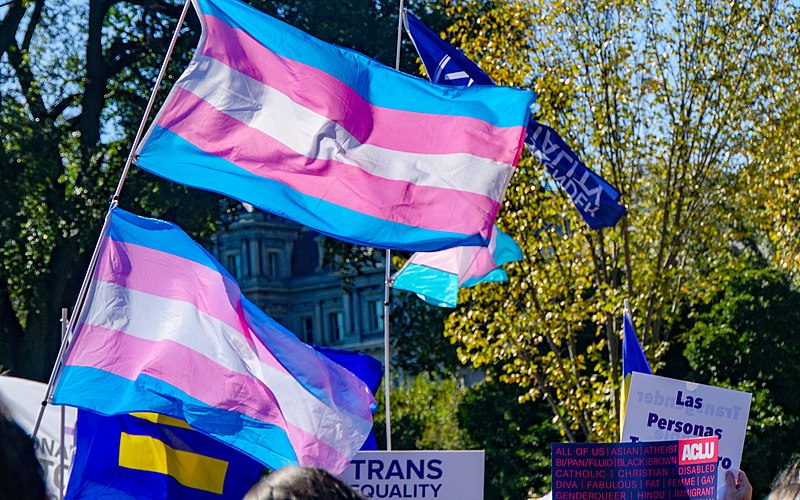J. K. Rowling’s ‘concerns’ about the trans community are not just transphobic, they are harmful to a community at greater risk of death and discrimination.
By the time J. K. Rowling hit publish on an essay she wrote to her website, the bodies of two of the latest victims of transphobic violence in the U.S. had been reported days earlier.
Dominique Rem’mie Fells’ body was found near a ravine in Philadelphia and Riah Milton’s, just hours later, in Ohio. As I write this, friends of 17-year-old Brayla Stone prepare to host a virtual vigil for the slain teenager this evening (June 29, 2020) when her death remains, as is usually the case for trans individuals, underreported.
Their deaths bring the total number of people murdered in the trans and gender-diverse community in the U.S. to at least 16. The specific number of deaths in the trans community aren’t tracked in Canada, but they are likely similar.
In many countries, including our own, the impact of transphobic discrimination and prejudice, combined with sexism and racism has meant that trans individuals, particularly Black trans women, face higher rates of poverty, unemployment, homelessness and death.
To Rowling, however, trans people – whose very well-being is threatened within a society that largely shares her views- are the issue.
In her lengthy personal essay, Rowling writes of “being worried” about trans activism, of “the dangers to young people” and for a supposed “erosion” of rights for women and girls. What Rowling thinks is the courageous act of speaking out for what she believes in is really the abhorrent act of invalidating the lived experiences of millions of people who have chosen to pursue the very brave act– what shouldn’t be but is in our world—of being who they are, whether they are supported or not.
While slow, as cis women and girls continue to make societal strides, the basic rights of trans communities have been historically ignored.
“LGBTQ2S youth, have distinct and complex needs, however, they are frequently discriminated against and excluded from services that are meant to support all young people, regardless of gender and sexual identity,” observed researcher Alex Abramovich in a study on LGBT youth homelessness in Canada.
“Family rejection, inadequate social services, institutional erasure, homophobic and transphobic violence, and discrimination in shelters and housing programs make it difficult for LGBTQ youth to secure safe and affirming places to live,” notes Abramovich.
Forced to escape unaccepting families and, as a result, miserable home lives, and navigate a society hostile to their existence with so few support services to meet their specific needs, homelessness is an all too common experience for members of the trans community.
25% of trans youth in Canada have reported running away from home. Of the 35,000 youth that experience homelessness in Canada every year, 30% identify as belonging to the LGBTQ community.
“[Trans people] are really [limited] in how they can get the right support, because not only is their identity under crisis, [trans individuals experiencing homelessness are] housing insecure [and may also be] food insecure,” says Rachel Walser, a Shelter Coordinator with the YW. “If somebody is trans and [experiencing] homeless[ness], they’re usually more vulnerable because of the[se] complicating factors.”
The YW isn’t the only shelter in the region that accommodates trans folks, as all shelters are required to have a policy on providing access to trans communities, but we are one of few where all trans folks are welcome. This is far from enough. While the number of trans folks who access our shelter services annually is low, our service providers, like Racheal, understand that the need is high. But, as with most other spaces in any given city, shelters may be another place where a trans person’s identity is not affirmed and can pose further risk to their safety. As such, trans individuals are more likely to engage in high-risk behaviours in order to support themselves as conventional work is hard to secure due to discrimination.
“I’ve had trans clients that were sex workers. I’ve had trans clients that were sexually trafficked. I’ve had trans clients who have gone to [great] lengths to try and keep themselves out of shelter,” Racheal tells me over the phone. “Trying to keep [trans folk] safe [should be] a lot higher [priority] because they’re not cared for in the same social systems.”
In using her very large platform to declare her bigoted beliefs, Rowling primes her receptive audience to fear trans people and provides an essay’s worth of justifications for the continued harms endured by trans-identifying folks which poses great ideological and actual harm to a community already at greater risk of death and discrimination. Because, while her beliefs are hateful, words can embolden action. And that action, for too long and especially for trans folk, has been violence, rejection and social exclusion.
At the YW we do our best to make sure our trans clients are heard. We ask for pronouns and we accommodate people based on their distinct needs as communicated to us by them. Still, we have much to learn. Our system isn’t perfect but we’re always listening, learning and encouraging feedback from our clients. We don’t yet know what the ideal gender-variant shelter looks like, but we stand firm in the belief that one is possible.
For now, we try our best to provide safe spaces for individuals too often overlooked. We hope we won’t always be the only one. Because, as Rowling’s harmful beliefs prove, transphobia won’t soon go away and while the urgent need to protect trans communities continues to grow, whether adverse or enchanting, Rowling’s words find an audience and invite debate and not, what should be, denunciations.
For trans communities, the difference between Rowling’s novels and her blog post is, especially for Black trans women, the difference between prosperity and hardship, between life and death – very clearly distinct and not fodder for debate.
As pride month draws to a close, and the celebrations lessen, in a moment where a global pandemic confines trans folks in homes where they may be subject to physical and verbal harm and when our school boards refuse to fly the pride flag at all, here’s a strong reminder for Rowling and for anyone else going forward:
Trans rights are not dangerous.
Trans rights does not mean more rights for men.
Trans rights do not reverse the rights of cisgender people.
Trans rights are not up for debate.
Trans rights are human rights.
If you’re a trans individual in need of shelter you can contact Prevention & Diversion at (519) 624-9133 between 8 am and midnight. For more information about the YW and how to access our shelter services, you can contact us at (519) 744-0120.
Consider making a donation today and support the YW in our efforts to empower women and youth to achieve their full potential. Working together, we can make our community stronger.



